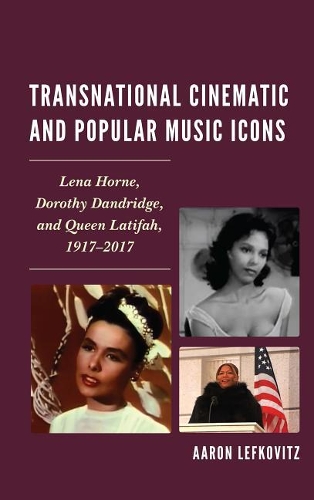
Transnational Cinematic and Popular Music Icons: Lena Horne, Dorothy Dandridge, and Queen Latifah, 1917-2017
(Hardback)
Publishing Details
Transnational Cinematic and Popular Music Icons: Lena Horne, Dorothy Dandridge, and Queen Latifah, 1917-2017
By (Author) Aaron Lefkovitz
Bloomsbury Publishing PLC
Lexington Books
8th September 2017
United States
Classifications
Professional and Scholarly
Non Fiction
Ethnic groups and multicultural studies
Gender studies: women and girls
Popular culture
Musicians, singers, bands and groups
Composers and songwriters
Individual actors and performers
Ethnic studies / Ethnicity
306.4840922
Physical Properties
Hardback
146
Width 156mm, Height 240mm, Spine 17mm
399g
Description
Transnational Cinematic & Popular Music Icons: Lena Horne, Dorothy Dandridge, & Queen Latifah, 1917-2017 centers twentieth and twenty-first century black-transnational stereotypes, celebrities, and symbols Lena Horne's, Dorothy Dandridge;s, and Queen Latifahs transnational popular cultural struggles between domination and autonomy, with a particular emphasis on their films and popular music. Linking each performer to twentieth century U.S., African-American, and global gender histories and noting the intersections of race, gender, sexuality, class, and empire in their overlapping transnational biographies, Transnational Cinematic & Popular Music Icons: Lena Horne, Dorothy Dandridge, & Queen Latifah, 1917-2017 connects Horne, Dandridge, and Latifah to each other and legacies of Hollywood stereotypes and popular musics internationally-routed politics. Through a close reading of Horne's, Dandridge's, and Latifahs films and popular music, the performers tie to historic black-transnational caricatures, from the tragic mulatto to Sapphire, Mammy, and Jezebel, and additional, non-white female performers, from Josephine Baker to Halle Berry, maneuvering within transnational popular culture industrial matrices and against white supremacist and hetero-patriarchal forces.
Author Bio
Aaron E. Lefkovitz teaches U.S. history at Harold Washington College, The City Colleges of Chicago, and DePaul University.
